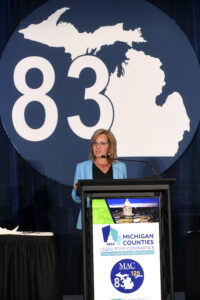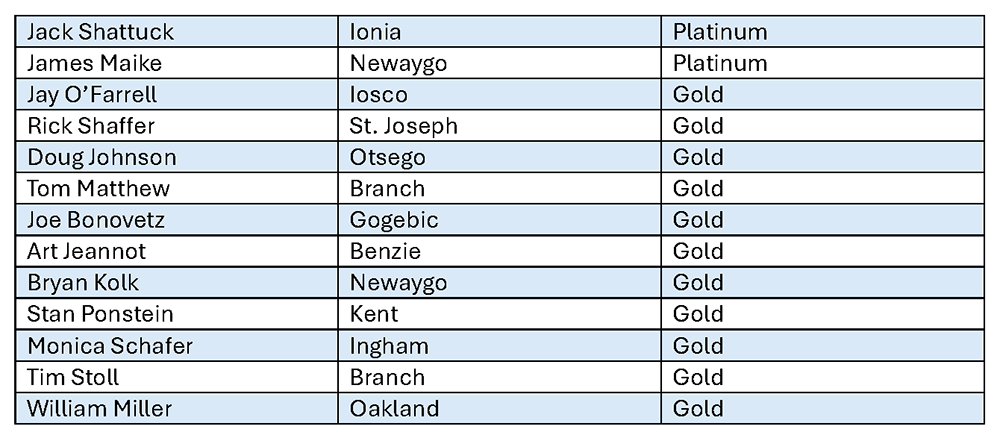Check out documents, videos from MAC conference

Deena Bosworth gives the MAC Legislative Update at the 2024 Legislative Conference on April 30. (Rod Sanford Photography)
Resources from the 2024 Michigan Counties Legislative Conference are now available to members who were unable to attend the event, held April 29-May 1 in Lansing.
“Those Revenue Sharing Trust Fund bills say we want to carve out 8 percent of the first 4 percentage points of the state sales tax, put that into a fund and then pay our revenue sharing payments out of that,” explained Governmental Affairs Director Deena Bosworth in her Legislative Update to the conference. “And that’s exactly what the House did. We couldn’t have asked for better. Until we get to the Senate.
“Then the Senate made their recommendations just a couple of days later. And in the Senate recommendations that is very much like a trust fund that we’ve been asking for. But they did it a little differently. … What they did was take 9.1 percent of (first 4 percentage points of) the state sales tax and dedicate that. … The Senate recommendation says whatever you are getting in fiscal year 24, you will always get because that’s your base amount. And then this additional $52.5 million would be distributed out on top of that base amount to counties in a way that is an inverse relationship to your taxable value in your county.”
See Bosworth’s full slide deck by clicking here. And MAC’s Issue Brief on the revenue sharing issue is found here.
Among videos available at the resource hub are ones from county leaders reporting on their work to deploy opioid settlement dollars to bolster services for those with substance use disorders. And more video segments will be added to the list in the days ahead from the Legislative Panel discussion on May 1 and other conference presentations.
Prisoner productivity credit bills introduced in Senate
 A package to allow certain prisoners to earn productivity credits to reduce their sentence was introduced in the Senate this week.
A package to allow certain prisoners to earn productivity credits to reduce their sentence was introduced in the Senate this week.
Senate Bills 861–864 would only apply to future sentences in allowing prisoners to receive productivity credits. Under the legislation, prosecutors would be required to notify victims at the time of sentencing that an earlier release date is possible ― if the offender completes productivity credits.
While completing productivity credits would deem a prisoner eligible for early release, the parole board will still recommendations regarding release dates, with final decisions remaining with judges and prosecutors.
SBs 861-864 would remove truth-in-sentencing, leaving many victims of crime with uncertainty regarding the minimum sentence their offender would serve.
The bills have been referred to the Senate Judiciary Committee.
MAC has joined the Prosecuting Attorneys Association of Michigan and the Michigan Attorney General’s Office in opposing this legislation.
For more information on this issue, contact Samantha Gibson at gibson@micounties.org.
MAC-backed bill to expand drug courts passes House
 Legislation to expand drug treatment court availability was voted out of the House this week. For several months, it remained on the House floor, needing a majority to be reinstated after the special elections in mid-April to receive enough votes.
Legislation to expand drug treatment court availability was voted out of the House this week. For several months, it remained on the House floor, needing a majority to be reinstated after the special elections in mid-April to receive enough votes.
House Bill 4525, by Rep. Graham Filler (R-Clinton), would allow certain offenders to be admitted to a drug treatment court with the approval of the judge, prosecutor and any known victim.
HB 4525 is part of a three-bill package, including HBs 4523 and 4524, by Reps. Kara Hope (D-Ingham) and Joey Andrews (D-Berrien), respectively. The package would expand the use of mental health and drug treatment courts, which are currently limited to nonviolent offenders, to include certain violent offenders ― but again only with approval from a judge and prosecutor and consent of any victim.
The bills now move to the governor.
MAC supports this legislation.
For more information on this issue, contact Samantha Gibson at gibson@micounties.org.
House moves court data collection bill
![]() Crucial legislation to promote court funding reform was concurred by the House on Thursday and sent to the governor for her signature.
Crucial legislation to promote court funding reform was concurred by the House on Thursday and sent to the governor for her signature.
HB 5534, by Rep. Kelly Breen (D-Oakland), would require the State Court Administrative Office to complete data collection and turn over to the Legislature by May 1, 2026, for advancement towards implementing the 2019 Trial Court Funding Commission recommendations.
HB 5534 was originally “tie-barred” to HB 5392, which extended the sunset on court fee authority to Dec. 31, 2026, and was signed by the governor last week.
MAC supports HB 5534 and long has supported adoption of the funding commission’s recommendations.
For more information on this issue, contact Samantha Gibson at gibson@micounties.org.
MACPAC reports healthy pace on donations in 2024
 With a surge coming out of the Legislative Conference, MACPAC, MAC’s political action committee, has raised nearly $10,000 in the 2024 cycle, a pace well ahead of historical averages.
With a surge coming out of the Legislative Conference, MACPAC, MAC’s political action committee, has raised nearly $10,000 in the 2024 cycle, a pace well ahead of historical averages.
Actions taken at the State Capitol all too often change the duties, resources and direction of county government. To ensure the best possible local governance for residents of Michigan, county leaders need to work in partnership with state officials. MACPAC was created to foster this partnership, by identifying and assisting state legislators who support public policies of benefit to counties and county government. Your donations to MACPAC are translated into donations to these key legislators. MAC staffers work with these lawmakers to ensure the expertise, experience and concerns of county officials are given proper consideration in the legislative process.
MAC wishes to thank the county commissioners who have proven themselves exceptionally generous by donating at the Platinum ($500 and more) and Gold ($250 to $499) levels this year:

To see a complete list of donors, click here.
NACo adds opioid resources for county leaders
 The National Association of Counties Opioid Solutions Center has new resources and tools available to counties. The Principles Quick Guide to Removing Policy Barriers is a tool that walks through how to conduct policy reviews that can assist in understanding how local policies and ordinances may prevent, or have a negative impact on, expansion of programs or implementation of new services to support those who use substances or individuals with substance use disorders.
The National Association of Counties Opioid Solutions Center has new resources and tools available to counties. The Principles Quick Guide to Removing Policy Barriers is a tool that walks through how to conduct policy reviews that can assist in understanding how local policies and ordinances may prevent, or have a negative impact on, expansion of programs or implementation of new services to support those who use substances or individuals with substance use disorders.
The Opioid Solutions Center also houses numerous strategy briefs on evidence-based strategies to address substance use and the drug overdose crisis. These briefs align with activities represented in Exhibit E, the allowable uses of opioid settlement funds.
For more information or for technical assistance, contact MAC’s Amy Dolinky at dolinky@micounties.org.
Report suggests three-pronged approach to overdose care
 Lansing-based consulting firm Health Management Associates has released a report from its recent Compassionate Overdose Response Summit. The summit included panels of national and international public health leaders, harm reduction experts, and researchers, highlighting research, strategies, and compassionate interventions to reduce fatal overdose. The event pointed to three key aspects of overdose care:
Lansing-based consulting firm Health Management Associates has released a report from its recent Compassionate Overdose Response Summit. The summit included panels of national and international public health leaders, harm reduction experts, and researchers, highlighting research, strategies, and compassionate interventions to reduce fatal overdose. The event pointed to three key aspects of overdose care:
- Focus on rescue breathing
- Titrated naloxone, as needed
- Compassionate aftercare
Consensus around dosing of naloxone among individuals who use drugs is a preference for 0.4 mg of the intramuscular injection and less than or equal to 4 mg of the intranasal spray.
To watch the summit and see presentation slides and notes, visit this link.
 Staff picks
Staff picks
- Fiscal Brief: MTF Distribution Formula to Local Road Agencies (House Fiscal Agency)
- A mileage tax for Michigan motorists? Lawmakers want $5M for pilot program (Bridge Michigan)
- HUD announces new energy standards for affordable housing (NACo News)
- Photos of Gordie Howe International Bridge construction (Detroit News)
